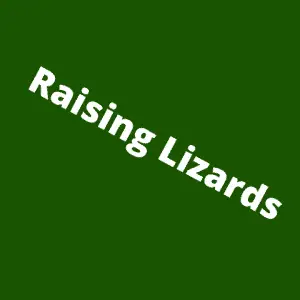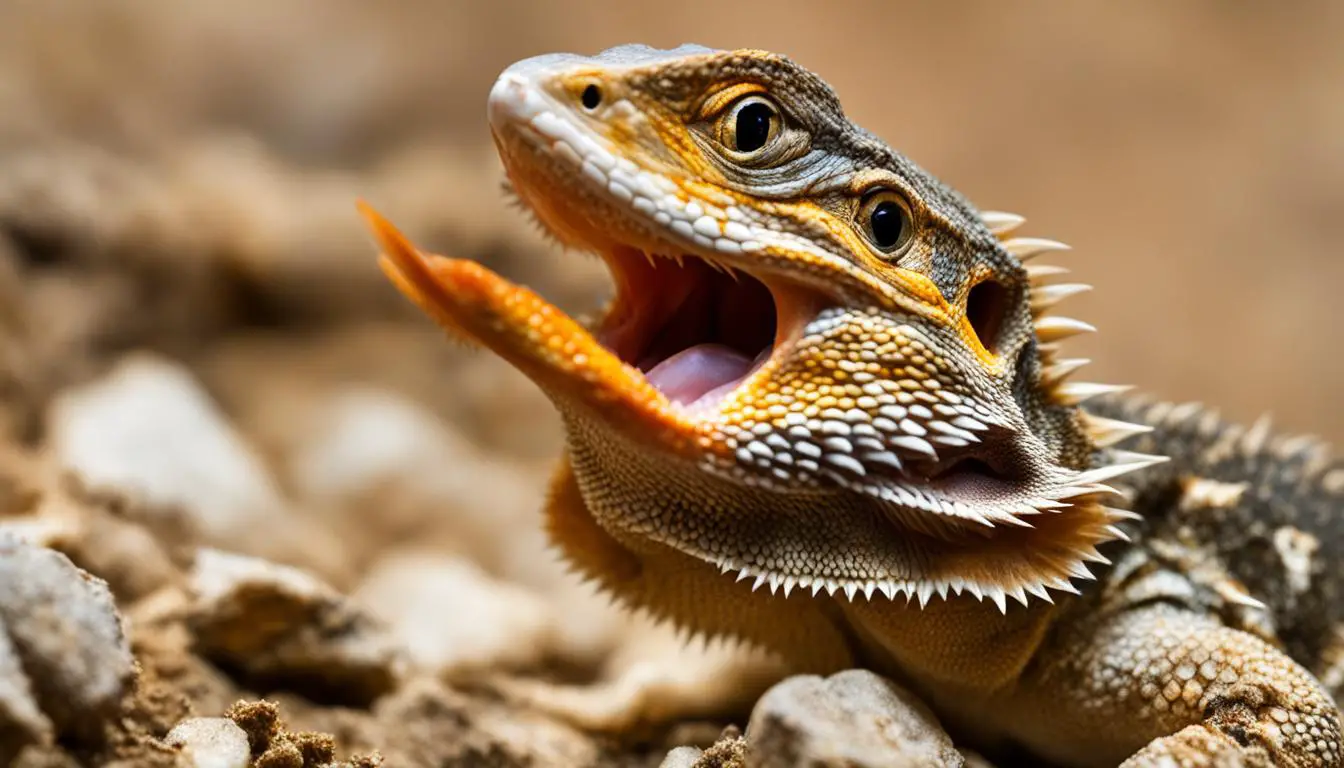Bearded dragons are fascinating creatures known for their unique appearance and gentle demeanor. As responsible pet owners, it’s crucial to provide them with a well-rounded and nutritious diet to ensure their overall health and well-being. In this article, we will explore the question: Can bearded dragons eat grubs? We will dive into the nutritional value of grubs, their safety for bearded dragons, and their role in maintaining an appropriate diet for these amazing reptiles.
Feeding a diverse range of insects, greens, and salad is essential for a bearded dragon’s balanced diet. Along with finely chopped salad made from dark leafy greens, butternut squash, and lettuces, livefood insects such as locusts and crickets are recommended staples. However, you may be wondering if grubs are a suitable addition to their diet. Let’s find out!
Key Takeaways:
- Grubs can be included in a bearded dragon’s diet as part of a balanced approach to nutrition.
- Grubs, such as mealworm larvae and black soldier fly larvae, provide protein and calcium, supporting healthy growth and bone development.
- Choose safe grubs from reliable sources and feed them in moderation to prevent choking hazards and digestive issues.
- A varied diet that includes greens, salad, live insects, and other food items is crucial for the overall health of bearded dragons.
- Consult with experts or veterinarians for specific dietary advice tailored to your bearded dragon’s needs.
Can Bearded Dragons Eat Grubs
Bearded dragons are omnivores and can eat a wide variety of worms, including hornworms, butterworms, waxworms, superworms, mealworms, silkworms, and grub worms.
Grub worms, also known as beetle larvae, are a great source of protein and essential nutrients for bearded dragons.
Grub worms are a great snack for bearded dragons, as their soft texture and small size make them easy to digest.
Grub worms should be offered to bearded dragons as an occasional treat since they have high fat content.
Grub worms should be fed to bearded dragons in moderation as they contain excess fats, which could lead to obesity if fed in excess.
It is important to ensure that the worms are gut-loaded before feeding them to bearded dragons. This means that the worms should be fed a nutritious diet before being fed to the bearded dragon.
The Nutritional Benefits of Grubs for Bearded Dragons
Grubs, such as mealworm larvae, superworm larvae, and black soldier fly larvae, provide several key nutritional benefits for bearded dragons. These tiny creatures are packed with essential nutrients that support the health and well-being of your pet. Grubs are particularly rich in protein, which is crucial for muscle development, growth, and overall energy. They also contain calcium, an essential mineral that plays a vital role in the development and maintenance of strong bones and teeth. bearded dragons and grubs
In addition to protein and calcium, grubs offer a range of vitamins and minerals that contribute to the overall health of bearded dragons. These include phosphorus, potassium, and other trace elements. By including grubs in your bearded dragon’s diet, you are ensuring they receive a well-rounded mix of nutrients that are necessary for their growth and vitality.
Furthermore, grubs add variety and natural stimulation to your bearded dragon’s diet. They provide a different texture and taste compared to other food items, keeping your pet engaged during mealtimes and preventing boredom. With their small size and ease of consumption, grubs can be a convenient and nutritious addition to your bearded dragon’s feeding routine.
| Nutrient | Mealworm Larvae | Superworm Larvae | Black Soldier Fly Larvae |
|---|---|---|---|
| Protein | 20% | 17% | 15% |
| Calcium | 0.1% | 0.1% | 0.05% |
| Phosphorus | 0.5% | 0.5% | 0.4% |
| Potassium | 0.6% | 0.6% | 0.5% |
Table: Nutritional content of different types of grubs for bearded dragons (per 100g)
Safe Grubs for Bearded Dragons
When it comes to feeding grubs to bearded dragons, it is crucial to choose safe options that provide the right balance of nutrients. Here are some safe grubs that can be included in your bearded dragon’s diet:
- Mealworm Larvae: Mealworm larvae are a common and easily accessible grub option. They are low in fat and high in protein, making them a suitable choice for bearded dragons.
- Superworm Larvae: Superworm larvae are larger than mealworm larvae, but they can still be offered to adult bearded dragons. These grubs are rich in protein and can provide a nutritious treat.
- Black Soldier Fly Larvae: Black soldier fly larvae, also known as phoenix worms or calci worms, are highly nutritious for bearded dragons. They have a balanced calcium-to-phosphorus ratio, which is important for bone health.
- Cockroach Nymphs: Cockroach nymphs are another safe option for feeding bearded dragons. They are small, easy to digest, and can be a good source of protein.
It is important to note that these grubs should be sourced from reputable suppliers to ensure their safety. Avoid collecting grubs from the wild, as they may contain harmful substances such as pesticides or insecticides. By choosing the right grubs and feeding them in moderation, you can provide your bearded dragon with a safe and nutritious diet.feeding bearded dragons grubs
Table: Safe Grubs for Bearded Dragons
| Grub | Nutritional Value | Safety |
|---|---|---|
| Mealworm Larvae | High in protein; low in fat | Safe when sourced from reputable suppliers |
| Superworm Larvae | High in protein; suitable as a treat | Safe when sourced from reputable suppliers |
| Black Soldier Fly Larvae | Rich in protein and calcium; balanced calcium-to-phosphorus ratio | Safe when sourced from reputable suppliers |
| Cockroach Nymphs | Good source of protein; easy to digest | Safe when sourced from reputable suppliers |
Feeding your bearded dragon a variety of safe grubs can contribute to their overall health and well-being. Remember to always monitor their diet and consult with a veterinarian or reptile expert for specific dietary recommendations.
Benefits of Including Grubs in Bearded Dragon’s Diet
Including grubs in a bearded dragon’s diet offers several benefits. Grubs are a rich source of protein, which is essential for their growth and muscle development. The protein in grubs helps support the overall health and well-being of your bearded dragon. Additionally, grubs are also a great source of calcium, which is crucial for strong bones and proper functioning of the nervous system.nutritional value of grubs for bearded dragons
Feeding grubs to your bearded dragon adds variety to their diet, providing different textures and flavors that can stimulate their natural feeding behaviors. This variety can help prevent boredom and enhance their overall enjoyment of mealtime. It also encourages them to eat a diverse range of foods, ensuring they receive a wide range of nutrients.
Incorporating grubs into your bearded dragon’s diet can also provide natural stimulation. In the wild, bearded dragons would encounter a variety of insects as part of their natural foraging behavior. By including grubs in their diet, you can mimic this natural stimulation and help satisfy their instinctual hunting and feeding instincts.
Benefits of Including Grubs in Bearded Dragon’s Diet:
- High protein content supports growth and muscle development
- Rich source of calcium for strong bones and nervous system functioning
- Provides variety and different textures/flavors
- Stimulates natural feeding behaviors and satisfies hunting instincts
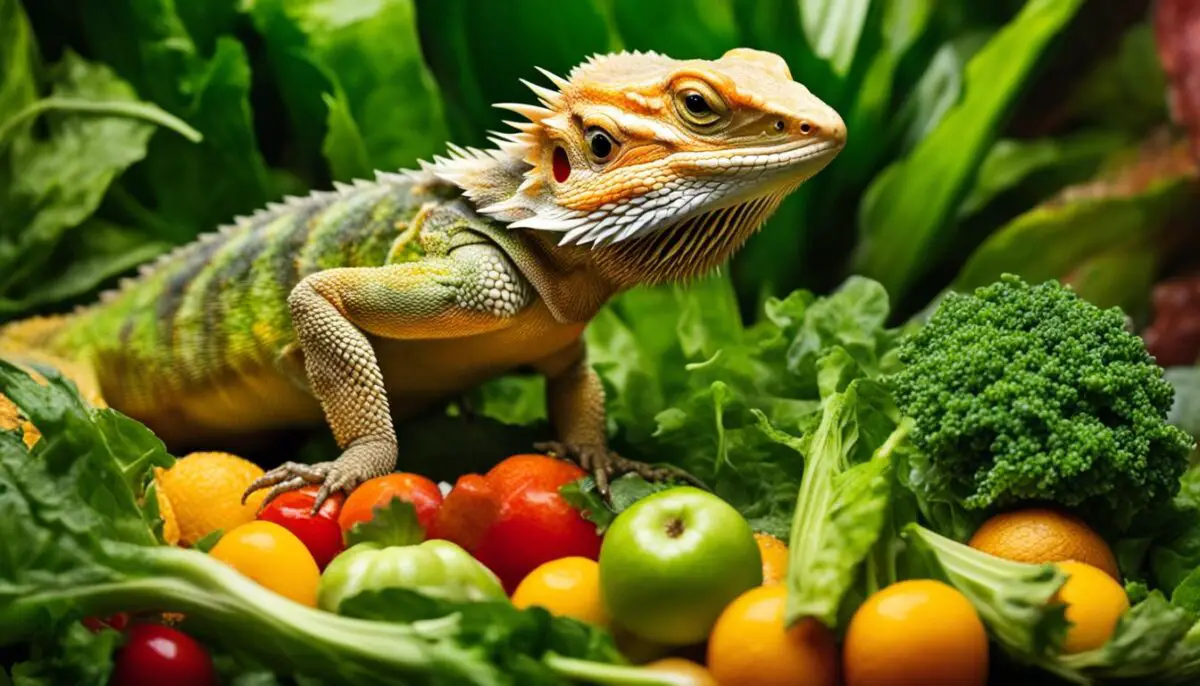
As with any food, it is important to feed grubs in moderation and as part of a balanced diet. While grubs offer valuable nutrients, they should not replace other essential food groups that bearded dragons require. It is recommended to consult with a reptile expert or veterinarian to ensure you are providing the right amount of grubs and maintaining a well-rounded diet for your bearded dragon.are grubs safe for bearded dragons
Risks of Feeding Grubs to Bearded Dragons
While grubs can provide nutritional benefits to bearded dragons, there are some risks associated with feeding them. It’s important for reptile owners to be aware of these risks and take necessary precautions to ensure the safety of their pets.
One risk is the potential choking hazard posed by grubs that are too large. Bearded dragons have small throats, and if a grub is too big, it can get stuck and cause choking. It’s crucial to choose grubs of an appropriate size for your bearded dragon, taking into consideration their age and size.appropriate diet for bearded dragons
Another risk is the possibility of impaction, which is a blockage in the digestive system. When bearded dragons consume too many grubs or any food item that is difficult to digest, it can lead to impaction. This can have serious health consequences and may require veterinary intervention.
Furthermore, it’s important to be cautious about the source of grubs. Wild-caught grubs can be unsafe as they may have been exposed to pesticides or insecticides. It’s recommended to purchase grubs from reputable sources that ensure the safety and quality of their products.
| Risks of Feeding Grubs to Bearded Dragons | |
|---|---|
| Choking Hazard | Grubs that are too large can pose a choking hazard to bearded dragons. |
| Impaction | Overfeeding of grubs can lead to impaction, which is a blockage in the digestive system. |
| Unsafe Food Sources | Wild-caught grubs may contain harmful substances, such as pesticides or insecticides. |
How to Feed Grubs to Bearded Dragons
When it comes to feeding grubs to your bearded dragons, there are a few important considerations to keep in mind. Choosing the right type and size of grubs is crucial for their overall health and well-being. Mealworm larvae, superworm larvae, black soldier fly larvae, and cockroach nymphs are suitable choices that provide the necessary nutrients.feeding insects to bearded dragons
Gut-loading the grubs before feeding them to your bearded dragon can significantly enhance their nutritional value. This process involves feeding the grubs nutrient-rich foods such as vegetables, fruits, and commercial gut-loading products. By doing so, you can ensure that your bearded dragon receives a well-rounded and balanced diet.
Feeding grubs to bearded dragons should always be done in moderation. While they offer nutritional benefits, it’s important to remember that grubs should not replace other essential food items. Be sure to provide a variety of foods, including leafy greens, salad, and live insects, to meet your bearded dragon’s dietary needs.
Suggested Feeding Schedule for Bearded Dragons:
- 2-3 times per week: Offer a small portion of gut-loaded grubs as a treat.
- Alternate days: Provide a mix of salad made from dark leafy greens, butternut squash, lettuces, rocket, watercress, and dried flower and herb mixes.
- Daily: Offer livefood insects such as locusts, crickets, calci worms, and occasionally roaches and waxworms.
- Include other food items like gel-based dragon foods and fresh fruits in their diet for added variety.
| Grubs | Nutritional Value |
|---|---|
| Mealworm Larvae | High in protein, moderate in fat, and a good source of calcium and vitamins. |
| Superworm Larvae | Richer in fat content but also high in protein and a good source of calcium. |
| Black Soldier Fly Larvae | High in protein, low in fat, and a good source of calcium and other essential nutrients. |
| Cockroach Nymphs | High in protein, low in fat, and a good source of calcium and other essential nutrients. |
Feeding grubs to your bearded dragons can be a rewarding experience for both you and your pet. By following these guidelines and providing a well-rounded diet, you can ensure their overall health and happiness.
Alternatives to Grubs for Bearded Dragons
While grubs provide a nutritious option for feeding bearded dragons, they are not the only food choice available. Here are some alternative options that can be included in a bearded dragon’s diet:
- Crickets: Crickets are a popular choice for feeding bearded dragons. They are rich in protein and can be gut-loaded to enhance their nutritional value.
- Dubia Roaches: Dubia roaches are another excellent insect option for bearded dragons. They offer a good balance of protein and calcium.
- Waxworms: Waxworms can be fed as occasional treats for bearded dragons. They are high in fat, so they should be given sparingly.
- Fresh Fruits and Vegetables: Including a variety of fresh fruits and vegetables in a bearded dragon’s diet is essential. These provide essential vitamins, minerals, and fiber.bearded dragons and insect protein
Offering a variety of food options ensures that bearded dragons receive a well-rounded diet with different textures and flavors. The nutritional needs of bearded dragons can vary at different stages of their life, so it is important to consult with a veterinarian or reptile expert for specific dietary recommendations for your pet.
Gut-loading Insects for Optimal Nutrition
When feeding alternative food items like crickets and dubia roaches, it is important to gut-load them before offering them to your bearded dragon. Gut-loading involves feeding the insects with nutrient-rich foods to enhance their nutritional value. This ensures that when your bearded dragon consumes the insects, they receive the maximum benefits.
Additionally, dusting the insects with calcium and vitamin supplements is important to meet the specific dietary requirements of bearded dragons. These supplements can be purchased from pet stores and should be used according to the manufacturer’s instructions.
Remember, a balanced and varied diet is crucial for the overall health and well-being of your bearded dragon. By offering a combination of grubs, alternative insects, and fresh fruits and vegetables, you can provide your pet with a nutritious and enjoyable diet.
| Food | Nutritional Value | Feeding Recommendation |
|---|---|---|
| Crickets | High in protein; source of essential vitamins and minerals | Feed in moderation, gut-load for optimal nutrition |
| Dubia Roaches | Good balance of protein and calcium | Feed in moderation, gut-load for optimal nutrition |
| Waxworms | High in fat; should be given sparingly as treats | Feed as occasional treats only |
| Fresh Fruits and Vegetables | Provide essential vitamins, minerals, and fiber | Offer a variety of fruits and vegetables regularly |
Grubs and the Overall Diet of Bearded Dragons
When it comes to the overall diet of bearded dragons, including grubs can be a beneficial addition. However, it’s important to remember that a balanced diet is key to their health and well-being. Grubs should not replace other essential food groups but should be part of a varied and nutritious meal plan.
Offering a diverse range of foods ensures that bearded dragons receive all the necessary nutrients they need to thrive. This includes a mix of finely chopped salad made from dark leafy greens, butternut squash, lettuces, rocket, watercress, and dried flower and herb mixes. Live food insects such as locusts and crickets are recommended staples, along with treats like calci worms, roaches, and waxworms. Additionally, incorporating gel-based dragon foods and other food items adds further variety to their diet.benefits of including grubs in bearded dragon’s diet
By providing this balanced approach to feeding, bearded dragons receive the necessary protein, calcium, vitamins, and minerals for healthy growth and development. Grubs, such as mealworm larvae, superworm larvae, and black soldier fly larvae, contribute to this nutritional balance. They offer a good source of protein and calcium, alongside other essential nutrients.
Overall, a balanced diet that includes a mix of greens, salad, live insects, and grubs ensures that bearded dragons receive optimal nutrition. By feeding a variety of foods, their nutritional needs are met, supporting their overall health and well-being.
The Role of Grubs in a Bearded Dragon’s Diet
Grubs provide important nutrients, such as protein and calcium, that support the healthy growth and bone development of bearded dragons. They also add variety to their meals, preventing boredom and offering natural stimulation. However, it’s crucial to feed grubs in moderation and alongside other food items to maintain a balanced diet for these reptiles.
Feeding a variety of foods ensures bearded dragons receive a mix of nutrients, vitamins, and minerals. It’s essential to choose grubs from safe and reliable sources, ensuring they are properly sourced and cared for. Wild-caught grubs should be avoided, as they may contain harmful substances like pesticides or insecticides.best food for bearded dragons
By following a well-rounded meal plan that incorporates grubs along with other appropriate food items, bearded dragons can enjoy a balanced diet that promotes their optimal health and well-being.
Table: Nutritional Comparison of Different Grubs for Bearded Dragons
| Grub Type | Protein Content | Calcium Content |
|---|---|---|
| Mealworm Larvae | 17% | 0.1% |
| Superworm Larvae | 20% | 0.2% |
| Black Soldier Fly Larvae | 16% | 0.3% |
As seen in the table, different grubs offer varying levels of protein and calcium. These nutrients are vital for the growth and overall health of bearded dragons. Mealworm larvae, superworm larvae, and black soldier fly larvae can all be included in their diet to provide these essential nutrients.
It’s important to note that while grubs contribute to a balanced diet, they should not be the sole focus. Including a variety of other foods, such as greens, salad, and live insects, ensures that all the nutritional needs of bearded dragons are met.
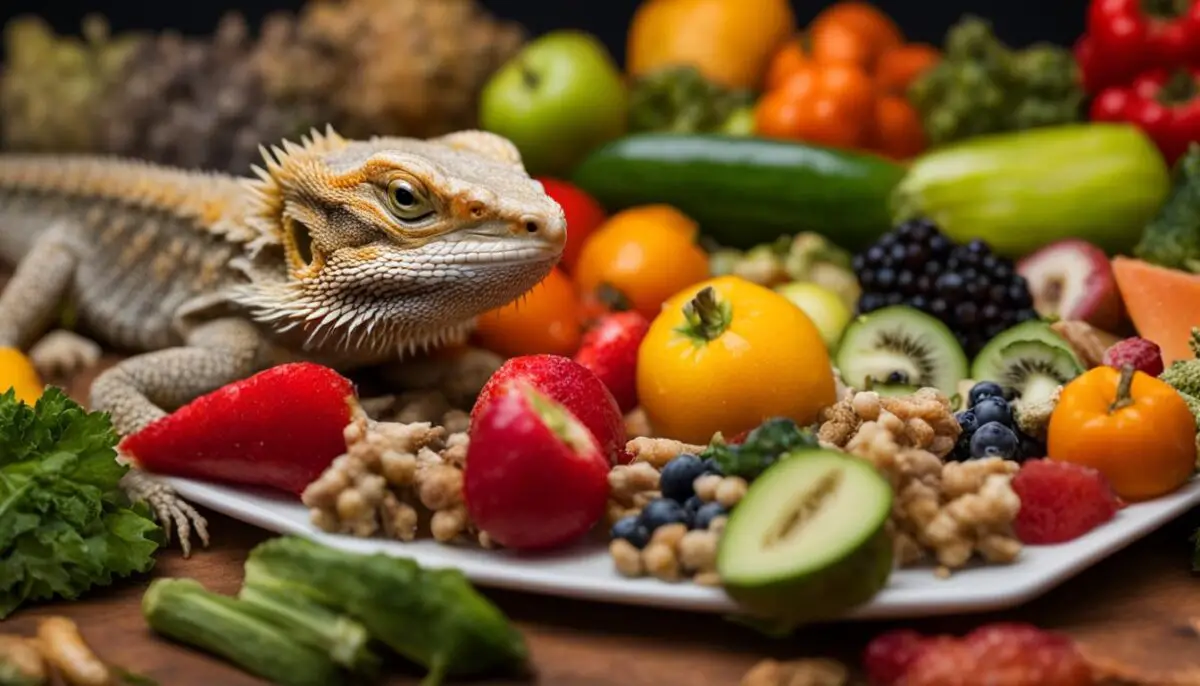
Can Bearded Dragons Eat Grubs? Expert Insights
When it comes to feeding grubs to bearded dragons, experts generally agree that they can be a safe and healthy addition to their diet. Grubs, such as mealworm larvae, superworm larvae, and black soldier fly larvae, offer essential nutrients such as protein and calcium, which support the growth and development of these reptiles. However, it is important to feed grubs in moderation and from a reliable source to ensure their safety.
While grubs provide nutritional benefits, experts emphasize the importance of a balanced diet for bearded dragons. Including a variety of foods such as greens, salad, live insects, and other food items is crucial to meet their nutritional needs. Grubs should be seen as a part of the overall diet, not a replacement for other important food groups.
Consulting with a veterinarian or reptile expert is always recommended to get specific dietary advice for your bearded dragon. These professionals can provide guidance on the proper feeding techniques, appropriate sizing of grubs, and the overall diet that will support the health and well-being of your pet.
Giving Your Bearded Dragon the Best
- Feed grubs in moderation: While grubs offer nutritional benefits, it’s important not to overfeed them to your bearded dragon. Moderation is key to avoid potential risks such as choking hazards or digestive blockages.
- Choose safe and reliable sources: Ensure that the grubs you feed your bearded dragon come from reputable sources. Avoid wild-caught grubs, as they may contain harmful substances such as pesticides or insecticides.
- Offer a variety of foods: To provide a balanced diet, include a mix of greens, salad, fresh vegetables, live insects, and occasional treats like grubs. This variety ensures that your bearded dragon receives all the necessary nutrients for optimal health.
“Feeding grubs to bearded dragons can be a beneficial addition to their diet, as long as it is done in moderation and alongside a well-rounded meal plan. Consulting with a reptile expert will help you make informed decisions and ensure the overall well-being of your pet.” – Dr. Sarah Thompson, Reptile Nutrition Specialist
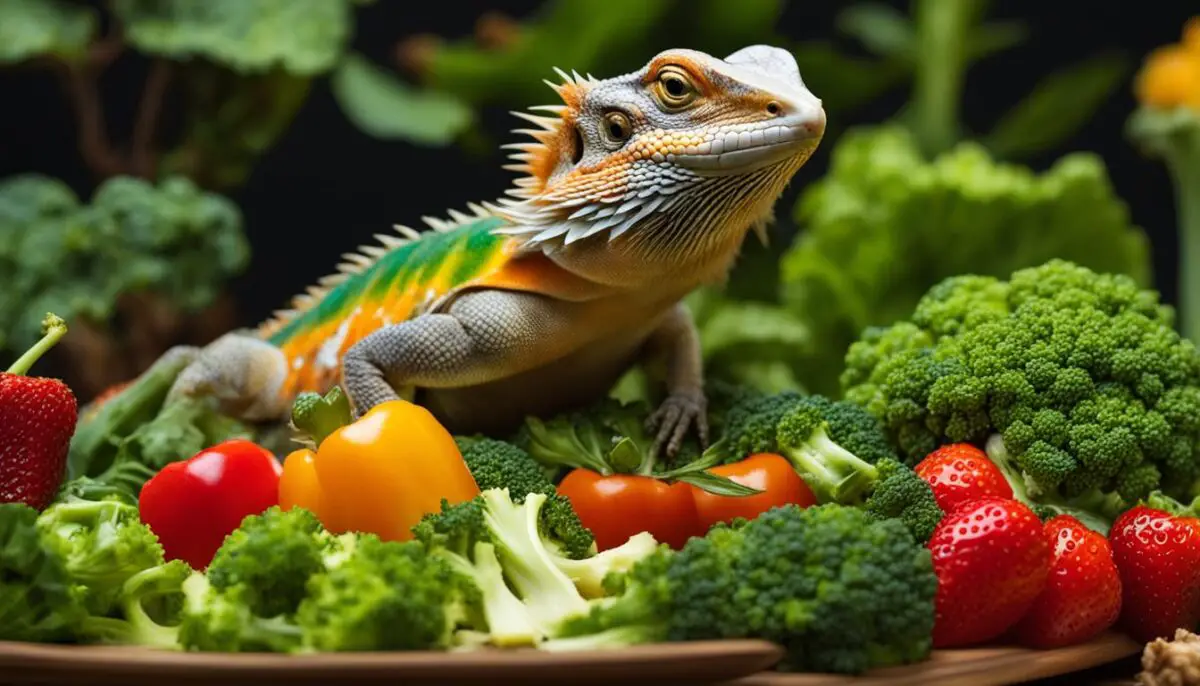
| Grub Type | Nutritional Value | Availability | Feeding Frequency |
|---|---|---|---|
| Mealworm Larvae | High in protein and calcium | Readily available at pet stores and online | Feed as treats in moderation |
| Superworm Larvae | Rich in protein and calcium | Easily found at pet stores and online | Feed in moderation as treats |
| Black Soldier Fly Larvae | Good source of protein and calcium | Available at pet stores and online | Feed in moderation as part of a balanced diet |
Frequently Asked Questions about Feeding Grubs to Bearded Dragons
If you’re considering adding grubs to your bearded dragon’s diet, you may have some questions. Here are the frequently asked questions about feeding grubs to bearded dragons:
Can bearded dragons eat grubs?
Yes, bearded dragons can eat grubs. Grubs provide essential nutrients like protein and calcium, which are important for their growth and overall health. However, it’s important to feed grubs in moderation and as part of a balanced diet that includes a variety of foods.
What are safe grubs for bearded dragons?
Some safe grubs for bearded dragons include mealworm larvae, superworm larvae, black soldier fly larvae, and cockroach nymphs. These grubs are readily available at pet stores and online. It’s crucial to avoid wild-caught grubs, as they may contain harmful substances.
How do I feed grubs to my bearded dragon?
When feeding grubs to your bearded dragon, choose the right type and size of grubs. Gut-loading the grubs with nutrient-rich foods before feeding them to your bearded dragon can enhance their nutritional value. Grubs should be fed in moderation as treats and alongside a balanced diet that includes other food items.
| Question | Answer |
|---|---|
| Can bearded dragons eat grubs? | Yes, bearded dragons can eat grubs. Grubs provide essential nutrients like protein and calcium. |
| What are safe grubs for bearded dragons? | Safe grubs for bearded dragons include mealworm larvae, superworm larvae, black soldier fly larvae, and cockroach nymphs. |
| How do I feed grubs to my bearded dragon? | Choose the right type and size of grubs. Gut-load the grubs with nutrient-rich foods and feed them in moderation as treats. |
Remember, it’s always a good idea to consult with a veterinarian or reptile expert for specific dietary advice for your bearded dragon. They can provide tailored guidance and ensure the best care for your pet.
Conclusion
In conclusion, grubs can be a valuable addition to a bearded dragon’s diet. These small insects provide essential nutrients such as protein and calcium, supporting their overall health and growth. Including grubs in moderation and alongside a balanced diet can offer variety and natural stimulation for your pet.
When feeding grubs to bearded dragons, it is important to choose safe options from reliable sources. Mealworm larvae, superworm larvae, black soldier fly larvae, and cockroach nymphs are all suitable choices. Avoid wild-caught grubs, as they may contain harmful substances.
Remember, grubs should not replace other important food groups in your bearded dragon’s diet. A well-rounded diet should include a mix of greens, salad, live insects, and other food items. Consulting with a veterinarian or reptile expert can provide you with specific dietary advice tailored to your bearded dragon’s needs.
By following these guidelines and providing your bearded dragon with a varied and nutritious diet, you can ensure their overall well-being and happiness as a pet.
FAQ
Can bearded dragons eat grubs?
Yes, bearded dragons can eat grubs as part of a balanced diet.
What are the nutritional benefits of grubs for bearded dragons?
Grubs provide protein, calcium, and other essential nutrients for the growth and development of bearded dragons.
What are safe grubs for bearded dragons?
Safe grubs for bearded dragons include mealworm larvae, superworm larvae, black soldier fly larvae, and cockroach nymphs.
What are the benefits of including grubs in a bearded dragon’s diet?
Including grubs in a bearded dragon’s diet adds variety, natural stimulation, and nutritional value to their meals.
Are there any risks in feeding grubs to bearded dragons?
Feeding grubs that are too large or overfeeding grubs can pose risks such as choking and impaction.
How should grubs be fed to bearded dragons?
Grubs should be fed in moderation and alongside a balanced diet, and they can be gut-loaded with nutrient-rich foods for enhanced nutrition.
What are some alternatives to grubs for bearded dragons?
Crickets, dubia roaches, waxworms, and fresh fruits and vegetables are alternative food options for bearded dragons.
How does grubs fit into the overall diet of bearded dragons?
Grubs should be seen as a part of the overall diet for bearded dragons, which should include a mix of greens, salad, live insects, and other food items.
What do experts say about feeding grubs to bearded dragons?
Experts generally agree that grubs can be a safe and healthy addition to a bearded dragon’s diet when fed in moderation and alongside a balanced diet.
Are there any other frequently asked questions about feeding grubs to bearded dragons?
Yes, some other frequently asked questions include the safety of grubs, how to feed grubs to bearded dragons, and the appropriate size of grubs for feeding.
